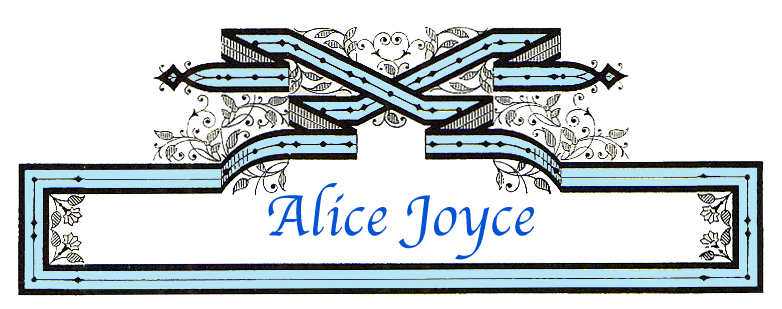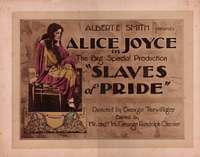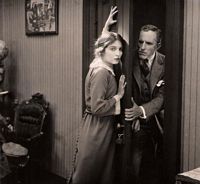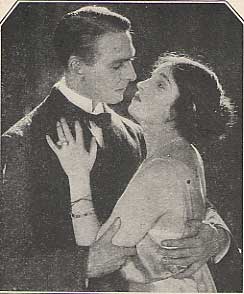

Slaves of Pride (1920) Vitagraph Co. of America. A Vitagraph Special. Distributor: Vitagraph Co. of America. Director: George W. Terwilliger. Scenario: William B. Courtney. Camera: Joe Shelderfer and Charles Davis. Editors: Mr. George Randolph Chester and Mrs. George Randolph Chester. Cast: Alice Joyce, Percy Marmont, Templer Saxe, Louise Beaudet. G.V. Seyffertitz, Charles A. Stevenson. 5 reels
The Archives du Film, Bois d'Arcy, France, has an unedited (?) 35mm negative with English intertitles and a length of 1169 meters. This is Alice Joyce's earliest extant feature, but does not appear at this time to be in screenable condition.
| Lobby card (Thanks to Derek Boothroyd for these scans) |  |
 | A still from the film with Alice and Gustav Von Seyffertitz |
| Still with Alice and Percy Marmont |  |
 | Another lobby card |
See a Lantern Slide advertising this film from the collection at the Cleveland Public Library
| Patricia Leeds | Alice Joyce |
| Brewster Howard | Percy Marmont |
| Mrs. Leeds | Louise Beaudet |
| Captain Apple | Templer Saxe |
| John Reynolds | G.V. Seyffertitz |
Thanks to Gustav von Seyffertitz and George Randolph Chester, this Vitagraph feature showing now at the Broadway misses being a great picture. Mr. Seyffertitz is one of the ablest American actors, but he cannot get the picture idea and will not take them seriously. As for Mr. Chester, he is an incurable village cut-up. He will monkey with the band-wagon and say something funny if it costs $100,000 in market value.
Played straight, this story, directed by George W. Terwilliger as best he could considering the interference he was subject to, has major possibilities. As it stands it constantly affects the lay mind with an undercurrent of irritation. This undercurrent is nothing less than the failure to ring true, the constant feeling of burlesque, the constant suspicion the audience is somehow being kidded.
Mr. Seyffertitz is partly responsible for this. He plays the heavy like an animated doll. He seems anything but human, and he knows better. Either he has a great legitimate director's contempt for pictures or the director, or Mr. Chester as overlord is mainly responsible. The last seems likely, because the inserts help the impression of travesty. And Percy Marmont and Templer Saxe send it along.
Strangely enough this fault is also a virtue, for there are just such fools as Captain Apple and just such egomaniacs as Howard. Names could be named. Miss Joyce's own performance is eminently satisfactory.
The story tells how the daughter of a social climber married a wealthy young man who took himself, his wealth, his ancestors and his position so seriously it hurt everybody. His general manager encouraged his mistaken self-esteem, taunted his young wife, made trouble between them and then copped the wife for himself. This doesn't sound, but Miss Joyce makes her attempt to bring her husband to his senses without smirching herself ring true. When he has lost his money she returns to him.
The photography is really beautiful. Inserts and general arrangement contribute to a completely satisfying technical effect. There is a death scene with a real thrill when a train seems to kill a man.
What Mr. Chester has tried and failed to do is get characterization into the flashes of conversation. He gets too much in, but anyone from his home town (Richmond) will derive either amusement or annoyance, depending on whether they belong to that family or not, from the fact that he has named his chief characters Leeds.
[omitted, 5 photos: 1. Percy Marmont grasping Alice Joyce's arms while she looks up at him. 2-3. Joyce and Gustav von Seyffertitz. Captions: John Reynolds (G.V. Seyffertitz) in the throes of an affair with his employer's wife (Alice Joyce) "Slaves of Pride." (Vita). Patricia (Alice Joyce) has difficulty in keeping her husband's private secretary at arm's length. "Slaves of Pride." (Vita.) 4. Woman in bed, Joyce sitting at side. Caption: Mrs. Leeds (Louise Beaudet) plans to sell her daughter (Alice Joyce) to the highest bidder in the marriage market in Vitagraph's "Slaves of Pride" 5. Marmont embracing Joyce. Caption: Brewster Howard (Percy Marmont) and his wife (Alice Joyce) have learned their lesson and have begun to appreciate each other. "Slaves of Pride" (Vitagraph)]
WE are of the opinion that the honors in "Slaves of Pride" should be given to Alice Joyce, and we are also in favor of giving them to Percy Marmont, so the best way out is to divide it up and give each half, for both are excellent.
In the above captioned photoplay we would say that Miss Joyce's charm and deftness has never been shown to better advantage, and as for Percy Marmont's poise and manliness in his characterization of the husband we are enthusiastic. Before long this gentleman will be able to place his name in the male section of famous "movie" stars. The keynote of "Slaves of Pride" is that money can never buy true love (a much abused theme). Miss Joyce finds this out in the part of Patricia Leeds, whose over ambitious mother makes her marry a wealthy man that she does not love. This same gentleman, who is so obsessed with excessive ideas of his own importance or, in other words, thinks he is "it," makes life a misery for poor Patricia.
The cruel husband, not being satisfied with Patricia's sadness, induces his secretary to humiliate her in every way possible (the villain!) At this point, however, as they say in the language of the street, the poor ill-treated creature "gets wise to herself" and winds the secretary around her fingers, which makes Mr. Husband take notice. A trip to the country brings the missing like--love--to both of their hearts; so ends the tale.
Again we would say that Miss Joyce's splendid portrayal of the down-hearted bride was exquisite. She delineated the character vividly, and surely, displaying inestimable magnetism. Percy Marmont, as Brewster Howard, the husband, was an excellent support. Also deserving of special mention is Louise Beaudet as Mrs. Leeds.
The masterful directing of George Terwilliger is very evident throughout the picture. The photoplay, which has been adapted from the story of William B. Courtney is full of heart interest, the kind that has a "punch" to it, and the kind that the "movie" followers like. Contrasting natures as the newly wedded pair display go right to the sensitive part of the spectator's mind. Of course, we would say that, the picture is not so wonderfully original, but as long as it holds the interest of the spectator, without putting them to any unnecessary mental strain, it contains the general requisites for a satisfying motion picture.
"Slaves of Pride"
Vitagraph Presents Alice Joyce Revealing the Tragic Slide of Mercenary Mariage. [sic]
Reviewed by Louis Reeves Harrison.
"SLAVES OF PRIDE," by William B. Courtney, penetrates the surface of a marriage of convenience and lays bare the selfish soul of a young millionaire. He is inocently [sic] selfish, a callow youth flattered by a business secretary into believing that he is already a great man and on his way to becoming an autocrat of fiance. He sees no deeper than what pleases his vanity. Neither the shallowness of his presence, nor the folly of it dawn upon him at any time until his collapse. It is a poor and unsympathetic character that Percy Marmont is called upon to portray, but he carries it consistently to the end.
[Omitted, photo of Joyce. Caption: Slavery Days expressed her by Alice Joyce in her Vitagraph, "Slaves of Pride."
In delicate contrast, is the role assigned to Alice Joyce. She is urged into a union with the aimless and stupid young man of inherited wealth, and makes the best of her trying situation Her performance is the highest value in the picture.
There is a tendency shown in both construction and treatment of "The Slaves of Pride" to elaboration and explanatory subtitle, causing it to move slowly at the start, but a strong interest is set up by the two leading characterizations, which compensates when the climax is approached. In the summing up, "Slaves of Pride" stands high because there is a definite impression made. Such was the effect on a crowded house at the Broadway Theatre, where the picture held close attention.
Cast.| Patricia Leeds | Alice Joyce |
| Brewster Howard | Percy Marmont |
| Mrs. Leeds | Louise Beaudet |
| Captain Apple | Templer Saxe |
| John Reynolds | G.V. Seyffertitz |
| Jason Leeds | Charles A. Stevenson |
Story by William B. Courtney.
Directed by George Terwilliger.
The Story.
"Slaves of Pride," are the impoverished mother of Patricia Leeds and the millionaire, Brewster Howard, to whom Mrs. Leeds manages to marry her daughter. Patricia accepts the situation in order to provide her mother with comfort and security in her declining days. She accepts it cheerfully, putting up with her husband's inordinate selfishness and vanity from the point of view of intellectual superiority. He has a one-cylinder mind, and no one is better aware of it than his wife. He has an almost incredible idea that he amounts to something, though he does not even manage his own affairs. He leaves all business transactions to his secretary, John Reynolds.
Reynolds hates his popinjay employer and plots his ruin. He is compelled to carry orders from the husband to the wife and manages to make them as offensive to her as possible. In this way, he gradually breaks down her serene philosophy. She is resting in the garden one day when he carries a demand for her to return to the house at once. She refuses. Her husband appears an commands her. She gently and firmly declines to be humiliated in the presence of others. Howard now refuses to speaks to her unless she humbly apologizes.
As an extreme measure, Patricia leaves her husband. He is pursued to her retreat by Reynolds who wishes to compromise her. The husband follows with detectives. Reynolds escapes. A long chase follows to determine who is the man in the case. It is discovered that Reynolds is the guilty one at a moment of his tragic death. Howard returns home to find himself abandoned by his wife and ruined by his business secretary. It dawns upon him at last that he hasn't a true friend in the world. He prepares to commit suicide, but the girl he has so grossly insulted returns and forgives him, even loves him now with motherly sympathy because he is so utterly helpless.
Program and Advertising Catchlines: Pretty Alice Joyce Starred in Entertaining Production that Reveals the Tragic Side of Mercenary Marriage.
Powerful Story of a Husband Who Thought that Marriage Was Only a Business Proposition, But Who Was Taught Different.
Charming Alice Joyce Stars in "Slaves of Pride"--The Story of a Husband Who is Reduced from Pride to a State of Humility.
Her Husband Was One of the "Slaves of Pride," But Alice Joyce Finally Brings Him to a Realization of Love and Life
Exploitation Angles: Make much of Miss Joyce, and through her sell the story. It has no big selling angles, but it will please those who see it so use the star to sell.
 |
Photo caption: "Slaves of Pride" is a modern allegory features by the fine acting of three players, Alice Joyce as Truth, Percy Marmont as Pride, and Gustav von Seyffertitz as Deceit.
"SLAVES OF PRIDE"--VITAGRAPH
VITAGRAPH has the courage to offer in Mr. and Mrs. G. R. Chester's "Slaves of Pride" a picture dependent largely upon the intelligence of its actors and their acceptance by the audience. In both plot and theme it is conventionally ancient. In fact, it is practically a modern allegory--with Alice Joyce playing "Truth," Percy Marmont "Pride," and Gustav von Seyffertitz "Deceit." They are talented players, these three, and each has the gift of projecting with a modicum of conscieus effort, the points he or she wishes to make. You never catch one of them out of character, nor find yourself doubting his or her reality.
The story of these slaves is of a young Mr. Howard who is most particular about the honor of his name and his line. He married the heroine, first because her grasping mama threw her at him, and second, because his secretary and social mentor approved of her. Once married, the new Mrs. Howard found conditions in the home of pride rather difficult, and after her husband had said to her, with some severity, "Mrs. Howard, your behavior displeases me," she determined to run away with the secretary--not with any intention of being a bad girl, but to humiliate her too proud husband. Young Mr. Howard followed her, and after learning that the deceitful secretary had escaped continued in pursuit of him until he (the fleeing sec) backed into a railroad train and was squashed. The husband went home and contemplated shooting himself, seeing that his stubborn pride had made a hash of his life. But visions of his wife, who really loved him, followed him from room to room until she herself appeared, and all was forgiven.
The Howards were, you feel sure, considerably less proudful after that, and much more human. Save for an occasionally strained formality--as in the case of "Mrs. Howard, your behavior displeases me." etc., the titles are carefully edited, preserving both the character and flavor of the story. The pictured background, taking in sections of another of those million dollar estates, is fine. Von Seyffertitz is a suave and dignified deceiver, Miss Joyce her usual lovely and perfectly poised self, and Percy Marmont an excellent choice for the proud Howard. Fine actors all. It cannot be sure of wide popularity, this picture, but is worth praising for the quality of its editing and its production.
Last revised January 1, 2015